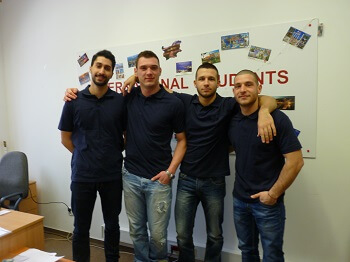The Erasmus+ Programme supports physical and blended mobilities of higher education students from any study field and cycle (short cycle, bachelor, master and doctoral levels). Students can either study abroad at a partner higher education institution or carry out traineeships in enterprises, research institutes, laboratories, organisations or any other relevant workplace abroad. Vasil Levski National Military University always welcomes students to study or train in any study field and cycle. We accept students for trainership all year round and for training only in the summer semester. You can find further information in the Academic calendar section. |  |
REGISTRATION PROCEDURES:
- for mobilities for study:
- Winter semester – till the end of June
- Spring semester – till the end of December
- for mobilities for traineeship:
- all year round – at least 2 months before the mobility:
- Application form
- Learning Agreement – Learning Agreement for studies/ Learning Agreement for traineeships (signed and stamped by your Higher Education Institution)
- 3 x Photo (4,5 x 3,5 cm) – Every Erasmus student will be issued a student ID and a permit. The third photo is related to your study documents.
- Accommodation Form if you wish to have accommodation.
- Copy of Health insurance and copy of an European Health Insurance Card
- Milena Daleva – Erasmus+ office manager
- Viktor Panicharov – Erasmus+ expert
- Petar Filev – Erasmus+ expert
- Original aplication form, related to your stay in Bulgaria
- Copy of a valid travel document (ID or Passport)
- Copy of a document, confirming medical insurance coverage
- Document, related to your accomodation in Vasil Levski NMU
- Certificate from Vasil Levski NMU confirming your admission
- Contract with the place where you are staying
- Original declaration, signed by a notary
- Original aplication form, related to your stay in Bulgaria
- Copy of a valid travel document (Passport)
- Copy of a document, confirming medical insurance coverage
- Document, related to your accomodation in Vasil Levski NMU
- Certificate from Vasil Levski NMU confirming your admission
- Contract with the place where you are staying
- Original declaration, signed by a notary
- Learning Agreement – After mobility for studies/ training (Transcript of Records)
- Certificate of Attendance
National Grade (2-6) | Numeric Value ** | Transliteration English | ECTS Grade |
6 | 5.50–6.00 | Excellent | A |
5 | 4.50–5.49 | Very Good | B |
4 | 3.50–4.49 | Good | C |
3 | 3.00–3.49 | Fair | D |
2 | 2.00–2.99 | Fail | F |
– | – | passed |
- Accommodation is valid only for the academic 2023/2024 year and depends on the chosen room, also the payment is per person per month in a renovated building within Vasil Levski NMU
- Breakfast, lunch and dinner is possible to be paid on the spot (around 4/ 5 BGN for a meal)
- Internet access is available
- Gyms and facilities on the university premises
- Orthodox church service on the university premises
- Medical centre on the university premises
Important days
3th of March - the Liberation Day
After five dark centuries of slavery, the Russian troops, supported by Romanian, Finnish armies and Bulgarian volunteer force won the freedom of our country. The military operations lasted for 1 year and the Russian-Turkish Liberation War was over on the 3th of March 1878 with the Treaty of San Stefano. The treaty set up an autonomous self-governing tributary principality Bulgaria with a Christian government and the right to keep an army. Its territory included the plain between the Danube River and the Balkan Mountain Range (Stara Planina), the region of Sofia, Pirot and Vranje in the Morava valley, Northern Thrace, parts of Eastern Thrace and nearly all of Macedonia. But the national pride was smashed by the Congress of Berlin which separated the independent lands of Bulgaria to Principality of Bulgaria and Eastern Roumelia- under the political and military domination of the Ottoman Empire. Bulgaria unites the divided territories on the 6th of September 1885.
3th of March is the National Holiday of Bulgaria and it is day when Bulgarians celebrate the Liberation from the Turkish slavery. The holiday is marked by impressive war parades and festive program on the Shipka peak in Central Balkan Mountain Range. The glorious hill was the spot of ferocious battles of the Bulgarian volunteers and Russian army against the Turkish troops.
24 May - Bulgarian Education and Culture
Bulgaria celebrates May 24 as the day of the Bulgarian Education and Culture and Slavonic Letters.
This day is also known as the Day of Slavonic Alphabet and Culture and the Saints Cyril and Methodius Day. This unusual holiday celebrates the Cyrillic alphabet and its developers, Cyril and Methodius. In the ninth century, these two Greek monks created the Cyrillic alphabet, a form of which is still in use today in Bulgaria.
06 September - Unification Day
Unification Day on 6 September is a national holiday in Bulgaria.
This day celebrates the unification of Bulgaria with the province of Eastern Rumelia in 1885. The unification almost doubled Bulgaria's size. As with other national holidays dealing with borders and origin, the day is honored with public ceremonies.
22 September - The Bulgarian Independence Day
On 22 September Bulgaria celebrates one of the most significant events in recent history. On this date in 1908 the Bulgarian state, one of the oldest in Europe, declared its independence. This is 30 years after the Russo-Turkish War of 1877-78, which ended with the signing on March 3, 1878 of San Stefano peace treaty. Thus, Bulgaria reappeared on the map of Europe after five centuries of Ottoman rule.
APPLICATION FORMS
- Application form.
- Learning Agreement for studies.
- Learning Agreement for traineeships.
- Accommodation Form.
_____